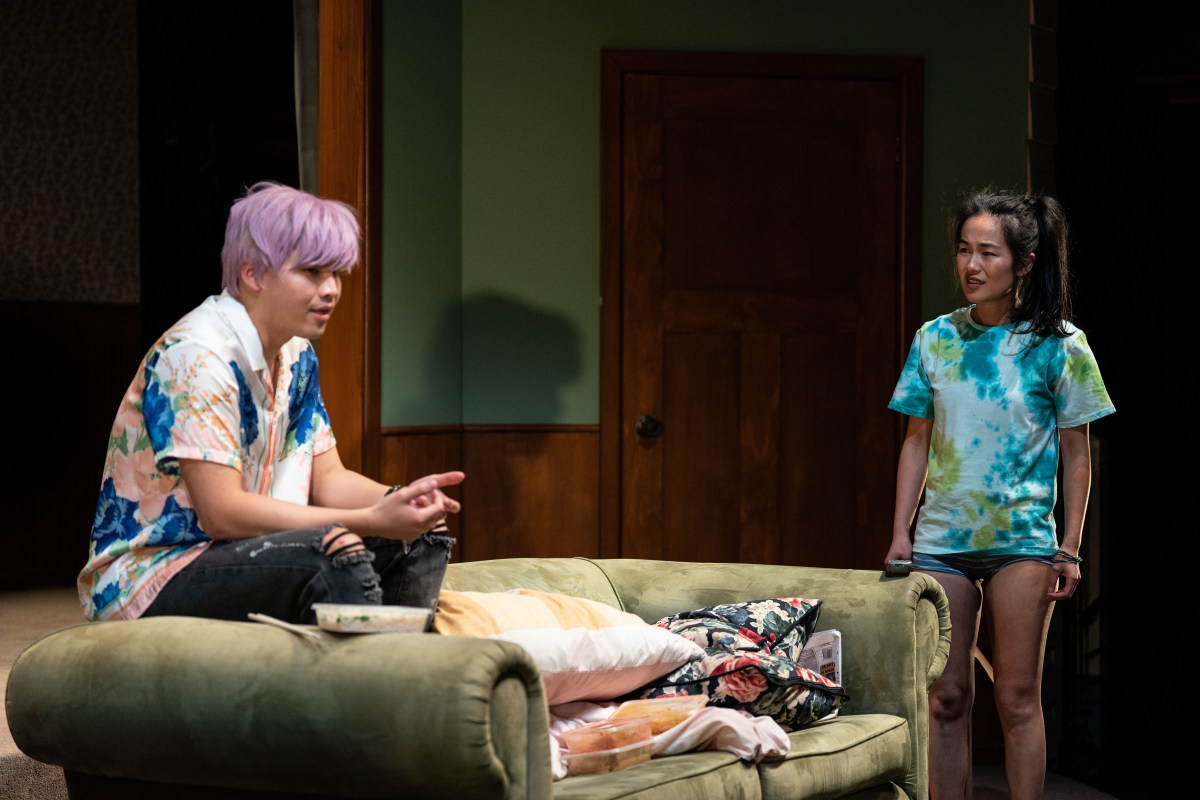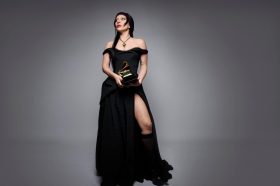Thirty-four-year old Lucy (Susanna Qian) has returned to the parental home in a black cloud. She’s resigned from her job, broken up with her boyfriend and needs time to massage her malaise.
Her parents, Shirley (Maud Davey) and George (Syd Brisbane), are both baffled and delighted to have their daughter back, but in her absence there have clearly been some changes. Lucy’s bedroom has been converted into sewing area to house her crafty mum’s new hobby, forcing Lucy to sleep on the couch. When she comes to reclaim an old, large cardboard box that once contained all her youthful possessions, Lucy is dismayed to find it empty.
K-Box begins in a fairly lightweight sitcom mode with a humorous touch and quick repartee between the empty nesters dealing with a prodigal child. As the play progresses, the tonal palette deepens and darkens.
Though fictional, the play is inspired by writer Ra Chapman’s own experiences of being an inter-country adoptee. Like Chapman, Lucy is of Korean heritage, while her adoptive parents are Caucasian. The trans-cultural complexities of growing up Asian in a white household are submerged in Lucy’s consciousness but come to the fore when a K-Pop star, Kim Han (Jeffrey Liu), suddenly drops into the family’s lives in the small country town.
Despite a charismatic performance by Liu, befitting a rock idol, Kim’s appearance is a strange narrative device, a clumsily convenient catalytic mechanism to kickstart the themes Chapman is grappling with. It’s through Kim and his probing existential questions that Lucy starts to re-examine her identity: why, for instance, can’t she speak a word of Korean ? Why has she, until now, never dated an Asian man?
The title is both literal and metaphorical, a play on the cardboard cavity that Lucy becomes enamoured with, caressing its sides, offering it a place at the dinner table and sitting inside its flimsy walls for reassurance. It serves as a tangible connection to her past and she uses it as a refuge. The box is also a symbol of categorisation, of being constricted when it comes to racial identity, and of trying to break apart such classifications.
Qian is an endearing protagonist though at times her behaviour seems to belong to a teenager rather than a 30-something woman. There’s a girly petulance and flightiness about her that feels at odds with her putative age. As her parents, Davey and Brisbane are played with the kind of daggy middle-class, long-term married couple vibe that elicits laughter and recognition.
Designer Romanie Harper’s lounge room and kitchen set typifies a modest, unpretentious family home, decorated for comfort rather than style. George and Shirley are at ease within its walls. They are well-meaning, solid parents to Lucy but their missteps are also explored, notably their tradition of wearing Korean national costume on the day that toddler Lucy was adopted – a tokenistic celebration of heritage that, as Kim tartly points out, also marks the loss of her culture.
Chapman teases out the nuances of inter-cultural adoption while asking in K-Box, is love enough? If you gain a child from another country, what of the psychological confusion she feels when she grows up estranged from her roots?
Lucy comes to a reckoning in the play, acknowledging a divisiveness within her, a tug between gratitude to her adoptive parents and a pull towards wanting to know more about her birth circumstances.
Read: Theatre review: Sunshine Super Girl
You’d be forgiven for thinking this was a domestic comedy though, for it takes a while until the momentum changes gear and the fussiness and playfulness of the earlier scenes (Shirley and George’s croquet playing; Kim’s pop-star dancing and singing in smoke and lights) finally peel away to expose the heart of K-Box: the nuanced story of transracial adoption, dislocation and identity.
K-Box by Ra Chapman
Director: Bridget Balodis
Dramaturg: Mark Pritchard
Set and costume designer: Romanie Harper
Lighting Designer: Amelia Lever-Davidson
Sound Designer: Marco Cher-Gibard
Stage Manager: Cecily Rabey
Cast: Syd Brisbane, Maude Davey, Jeffrey Liu, Susanna Qian
K-Box plays until 17 September.




